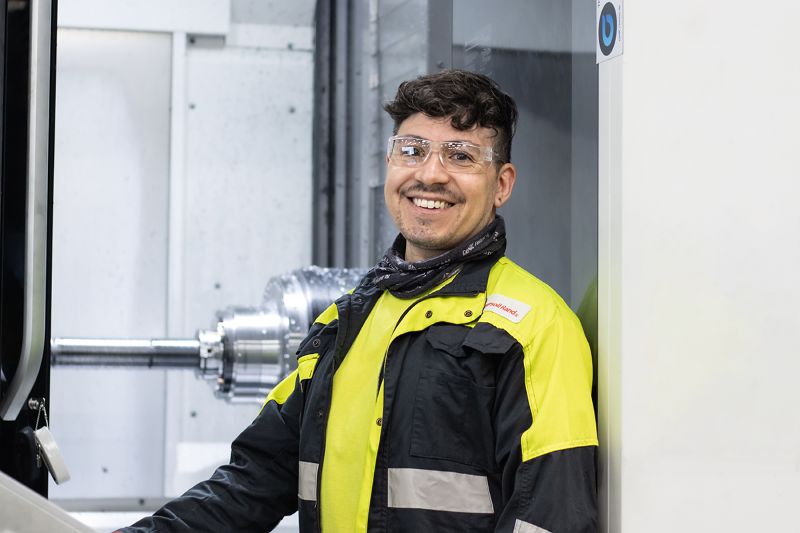CNC machinist
"I work in a factory hall. People often believe that the machining workshop is dark and dirty, but quite the opposite is true. Our workplace is clean and brightly lit."

- Angelo Ollikainen
- CNC machinist at Ingersoll Rand Finland Oy.
- Completed a further vocational qualification in production technology, machinist, at Tampere Vocational College Tredu.
- Six years of work experience in the field.
Briefly explain what you do for a living.
I’m a CNC machinist, i.e., I make different metal parts that are mainly used in compressors. CNC is an acronym for Computerized Numerical Control. It refers to computer-controlled machining methods based on using cutting, milling or drilling tools. Machining allows manufacturing of very precisely dimensioned products.
How have you ended up in the profession of your choice?
I moved from Chile to Finland in 2015 and studied Finnish for a year. I was hoping to get a job because the days felt long without any work. I applied for a study place at Tampere Vocational College in the metal sector because there was a shortage of labour in the field. In Chile, I had worked in completely different positions. There, I had completed a university degree. I was admitted to the metal-sector training programme, where I was the only immigrant. I did well, even though the training was in Finnish only.
In 2017, I started a work placement as part of my studies. The same workplace then hired me to a summer job and later to a part-time job. I graduated in 2019 and wanted to develop as a CNC machinist and advance in my career. Therefore, I decided to change workplaces and apply for a job at Ingersoll Rand. I like learning new things, and I’m currently studying an International Business degree at Turku University of Applied Sciences alongside work.
Describe your typical working day or week.
We work in three shifts, and there are five machinists working in each shift. Sometimes we are really busy, but it’s usually calmer at night. We monitor the situation of the machinery and ensure that the production runs smoothly. The machinery does high-precision work, so everything must function at the accuracy of one hundredth of a millimetre. I also perform blade and machinery maintenance.
The heaviest stage of the work is when we replace the parts being machined. They may be extremely heavy. In addition, they have several screws that must be tightened. Automation keeps on increasing all the time. Today, we have a robot that helps us in changing parts.
Production development engineers sometimes come to the machining side. I discuss the ongoing projects with them so that the work can be done as well and efficiently as possible.
What kind of work environment or working hours do you have?
I work in a factory hall. People often believe that the machining workshop is dark and dirty, but quite the opposite is true. Our workplace is clean and brightly lit. I very much appreciate the fact that my workplace takes good care of occupational safety, as there are, for example, a lot of forklifts moving around us.
This work is done in three shifts, which are from 6:00 a.m. to 2:00 p.m., from 2:00 p.m. to 10 p.m. and from 10:00 p.m. to 6 a.m. At work, we must wear work clothes, safety goggles and often also hearing protectors and gloves when working with chemicals, for example.
What kind of competence or qualities are required in the profession?
Most of all, the work requires precision. But patience is also needed, as things need to be done very carefully. I also feel that the desire to learn new things is a good characteristic, as the field is constantly developing.
What is the best thing about your profession?
In this profession, I like the fact that you see the result of your work as soon as new parts have been shaped. The working environment and atmosphere are really good. I have nice colleagues, and I always learn new things from them.
What are the downsides of the profession or what seems challenging?
Family life suffers a little bit from working in three shifts. After a night shift, I spend the day sleeping, so it’s a challenge to maintain any routines. Sometimes it annoys me if the part has been poorly attached to the machine and it’s not approved by production.
What would you tell a person considering the profession of a CNC machinist?
In my opinion, the market situation in this sector is very good, so there will certainly be jobs in the field. This work requires some understanding of the operating logic of computers and coding, so mathematical competence is useful.
How do you see the future of your profession?
There is plenty of work in the sector, but automation is increasing all the time. Therefore, people working in this profession must be willing to keep on improving their skills.
Photo: Katja Lehtinen
